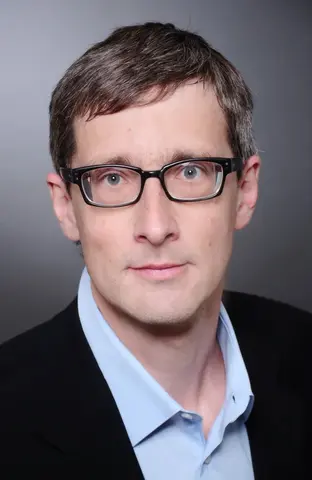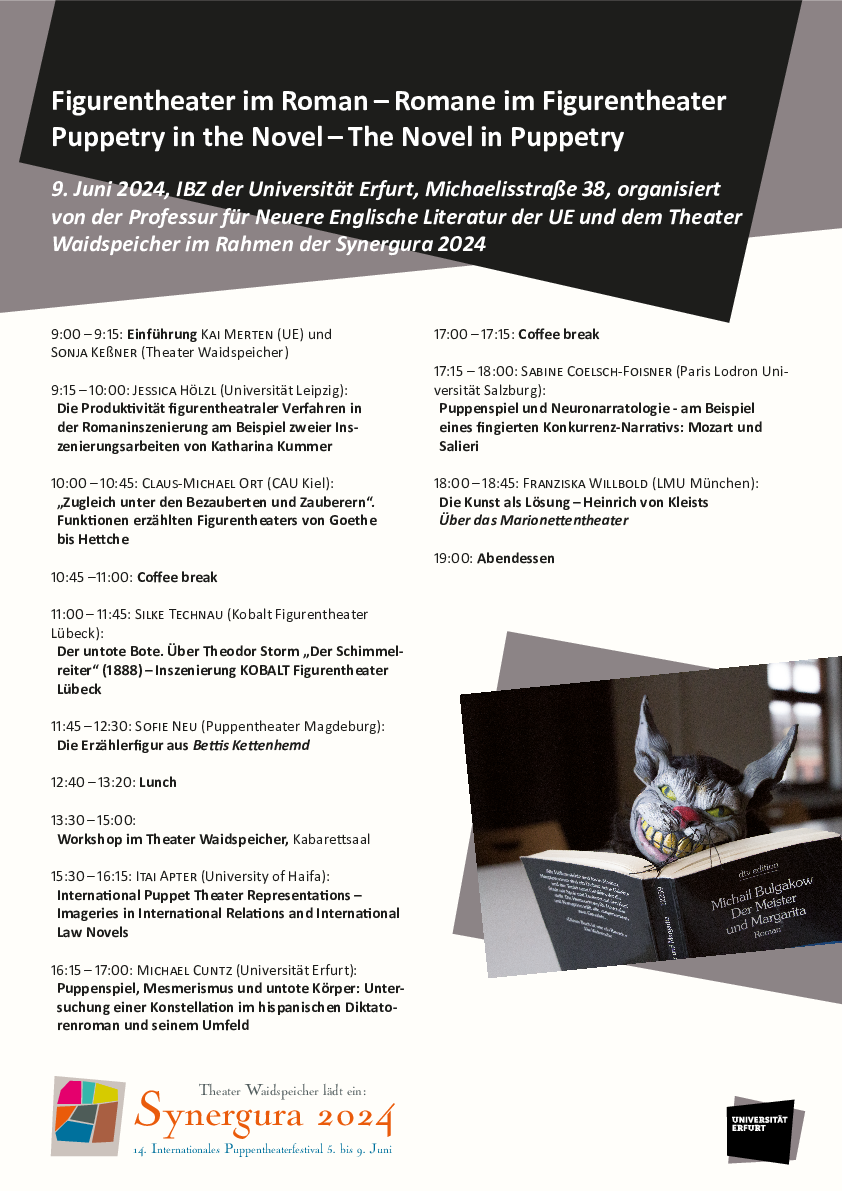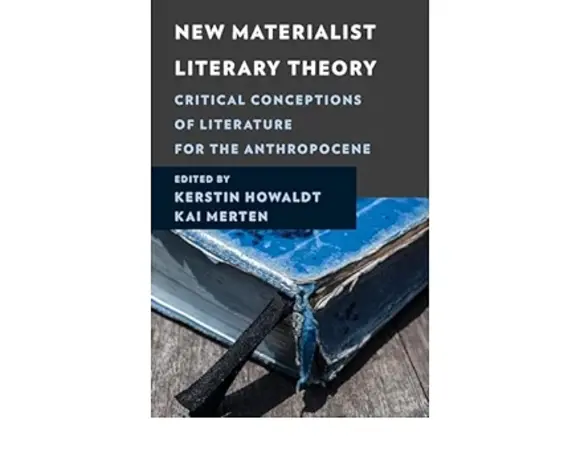Prof. Dr. Kai Merten
kai.merten@uni-erfurt.deProfessor of English Literature (Literary Studies)
Office hours
Wednesday 12-13 in my office.
Visiting address
Campus
Literary Studies
C23 – staff building 1
Alfred-Weber-Platz 6
99089 Erfurt
Mailing address
Universität Erfurt
Literary Studies
Postfach 90 02 21
99105 Erfurt

puppetry in the novel – novels in puppetry, workshop at the University of Erfurt in collaboration with the Waidspeicher Theatre as part of the Synergura 2024 festival on 9 June 2024
conference poster
Conference Poster

Curriculum Vitae
Kai Merten studied English Literature, Latin and Psychology at the Universities of Munich (LMU) and St Andrews. After completing his PhD in Munich in 2002, he was postdoctoral research fellow both at the Graduate School ‘Klassizismus und Romantik’ at the University of Gießen (JLU) and, with a research grant from the German Research Council (DFG), at the IASH of the University of Edinburgh. In 2007, he moved on to the University of Kiel (CAU) where he worked as a ‘wiss. Mitarbeiter’ (assistant lecturer). In 2011, he completed his habilitation at the CAU and received the venia legendi for ‘Anglistische Literatur- und Kulturwissenschaft’ (British Literary and Cultural Studies). Since April 2015, he has been professor for ‘Neuere Englische Literaturwissenschaft’ (Literature in English since the Renaissance) at the University of Erfurt.
Teaching and Research Interests
- British Romanticism
- Contemporary Poetry in English
- Literature and Media History
- Postcolonial Media Culture
- Theatre and Theatricality
- New Materialism
- Energy Humanities
- Watermills and other riverside buildings in British literature and culture
Research Projects
Erfurt Network on New Materialism
Erfurt Network on New Materialism
Project-related publications:
Kerstin Howaldt and Kai Merten, eds. New Materialist Literary Theory: Critical Conceptions of Literature for the Anthropocene (Series New Critical Humanities). Lanham: Lexington Books, 2024
Kai Merten, ed. Diffractive Reading: New Materialism, Theory, Critique (Series New Critical Humanities). London: Rowman & Littlefield International, 2021.
The Erfurt Network on New Materialism (ENNM) examines the neo-materialist currents in recent philosophy as well as Literary and Cultural Theory. Neo-materialist thought aims to re-assess and re-describe external ‘reality’ both after and beyond the linguistic turn. In so doing, it questions as well as transcends the premise that all reality is culturally constructed, while not falling behind but integrating this constructionism. Therefore, the group mainly deals with the question whether New Materialism can be used as a method (or as a critique of existing methods) in Literary and Cultural Studies.
In September 2019, we held an international conference on the topic of New Materialist Literary Theory.
As a starting hypothesis, the Erfurt Group has observed that there are two main positions in New Materialism: one position argues that all human agency is always already bound up with non-human agencies of the surrounding material world, as is reflected in ‘connection’ concepts such as Karen Barad’s ‘Onto-Epistemology’ or Donna Haraway’s ‘Naturecultures’. The other position claims that, on the opposite, human connections to the material world will never be able to make available the objects in their full potential and ‘being’ at all. This position is taken up in both ‘Object-Oriented Ontology’ and ‘Speculative Realism’.
The network aims to study both these positions while at the same time asking whether they can be, on the one hand, united and, on the other hand, related to literary texts and cultural practices.
Religious Media Conflicts in the Early Modern Period
Project-related publication: Kai Merten, ed. with Claus-Michael Ort. Konfessionspolitik und Medien in Europa 1500-1700: Konflikte, Konkurrenzen, Theorien (Series Diskursivierung von Wissen in der Frühen Neuzeit). Berlin: De Gruyter Oldenburg, 2021.
The volume, based on a conference in Gotha in 2017, discusses the thesis that the Reformation accusations of idolatry against traditional religious practices and objects from the early 16th century onwards discuss matter as a carrier or communicator of religious spirituality, and therefore as a medium. In this context, the volume is interested in religious conflicts between media, with media and in media such as image, text and theatre. Because of their religious foundation, the media conflicts described go far beyond theological debates and also include social, political and aesthetic issues. Overall, the 16th and 17th centuries are to emerge as a central period of European media history with strong effects up to the present day.
Puppetry as a Model of Literature and Language in the 20th and 21st century
Puppetry as a Model of Literature and Language in the 20th and 21st century
Puppet theatre has been in focus since the beginning of the 20th century as an avantgarde cultural practice throughout Europe and also in Thuringia, for example at the Bauhaus in Weimar or the important Waidspeicher Theater in Erfurt, the latter with its roots in modernist GDR puppetry. Situated between different art forms such as installation, object theatre and multimedia theatre, puppetry is a focal point of artistic aesthetics and cultural identity practice.
From this perspective, addressing puppetry in a range of 20th and 21st century novels has a self-reflexive quality, especially since the concept of puppet or 'figure' uniquely allows us to think together object and language, stage and textual page, and abstract concept and concrete embodiment. By examining English-language and non-English-language literary texts, the project will explore the extent to which puppetry can be contoured as a model of contemporary literary aesthetics, contemporary body culture/politics, or even (literary) language in general. A cooperation with the Theater Waidspeicher and the Synergura-Festival was implemented in 2024 (see above).
Research Group “Energy Ecologies 1800 – 1850”
Publications
Books
Books
- (2024). ed with Kerstin Howaldt. New Materialist Literary Theory: Critical Conceptions of Literature for the Anthropocene (Series New Critical Humanities). Lanham: Lexington Books.
- (2021). ed. Diffractive Reading (Series New Critical Humanities). London: Rowman & Littlefield International.
- (2021). ed. with Claus-Michael Ort. Konfessionspolitik und Medien in Europa 1500-1700: Konflikte, Konkurrenzen, Theorien (Series Diskursivierung von Wissen in der Frühen Neuzeit). Berlin: De Gruyter Oldenburg.
- (2018). ed. with Antje Kley. What Literature Knows: Forays into Literary Knowledge Production (Series Contributions to English and American Literary Studies 2). Berlin: Peter Lang.
- (2016). ed. with Lucia Krämer. Postcolonial Studies Meets Media Studies: A Critical Encounter. Bielefeld: Transcript.
- (2014). Intermediales Text-Theater. Die Bühne des Politischen und des Wissens vom Menschen bei Wordsworth und Scott (Berlin: De Gruyter) [Series of Anglia].
- Ed. with Hansjörg Bay (2006). Die Ordnung der Kulturen. Zur Konstruktion ethnischer, nationaler und zivilisatorischer Differenzen 1750-1850. Würzburg: Königshausen & Neumann. (Reviews in literaturkritik.de 2, Zeitschrift für Germanistik XVII, The German Quarterly 81, Anglia 126/1, Das Historisch-Politische Buch 55/2)
- (2004). Antike Mythen – Mythos Antike: Posthumanistische Antikerezeption in der englischsprachigen Lyrik der Gegenwart. München: Fink. (PhD prize of the Deutschen Anglistenverbands 2005; Reviews in Anglia 123/4, Anglistik 18/1, ZAA 54/1, Poetica 38, Museum Helveticum 62, International Journal of the Classical Tradition 13/3, Journal of Hellenic Studies 127)
Articles
Articles
- (2022). '‚Roundheads‘, ‚Soundheads‘ und ‚Hair in Characters‘: Zum Diskurs der Kurzhaarigkeit im englischen Bürgerkrieg'. Das Haar als Argument. Zur Wissensgeschichte von Bärten, Frisuren und Perücken. ed. Martin Mulsow. Stuttgart: Steiner. 193-210.
- (2021). 'Reading after Barad (and Blumenberg): Diffraction, intervention, human agency'. Critical Theory and New Materialisms. ed. Artur Bueno, Christoph Henning and Hartmut Rosa. Abingdon: Routledge. 154-163.
- (2021). 'Introduction: Diffraction, Reading, and (New) Materialism'. Diffractive Reading (Series New Critical Humanities). ed. Kai Merten. London: Rowman & Littlefield International. 1-27.
- (2021). With Claus-Michael Ort. 'Medien und Religion: Medienwissenschaftliche, zeichentheoretische und diskursgeschichtliche Annäherungen'. Religiöse Medienkonflikte in der Frühen Neuzeit (Series Diskursivierung von Wissen in der Frühen Neuzeit). ed. Kai Merten and Claus-Michael Ort. Berlin: De Gruyter Oldenburg. 1-36.
- (2018). '‘His ignorance were wise‘: Gendered Knowledge in Love’s Labour’s Lost'. What Literature Knows: Forays into Literary Knowledge Production (Series Contributions to English and American Literary Studies 2). ed. Antje Kley and Kai Merten. Berlin: Peter Lang. 27-44.
- (2016) 'Media History in 17th- and 20th-Century Visual Poetry in English: Two Case Studies'. Literary Visualities: Visual Descriptions, Readerly Visualisations, Textual Visibilities. ed. Guido Isekenmeier and Ronja Roxane Bodola. Berlin: De Gruyter. 203-221.
- (2016). With Lucia Krämer. 'Introduction'. Postcolonial Studies Meets Media Studies: A Critical Encounter. ed. Lucia Krämer and Kai Merten. Bielefeld: Transcript. 7-22.
- (2013). 'Poetic Genres in the Romantic Age I: William Wordsworth’s and Samuel Taylor Coleridge’s ‘Lyrical Ballads’, Nature Poetry'. A History of British Poetry: Genres – Developments – Model Interpretations. ed. Sibylle Baumbach, Birgit Neumann and Ansgar Nünning. Trier: WVT. 217-228.
- (2012). 'Photopoetics, Précinema and the Web: Dickensian Media History'. Anglistentag 2011, Freiburg: Proceedings. ed. Monika Fludernik and Benjamin Kohlmann. Trier: WVT: 273-281.
- (2011). '‚Take a fellow of plain and uncoined constancy‘: Individualismus und Geschlechterdifferenz in neueren Adaptionen und Interpretationen von Henry V'. LWU XLIV/1. 31-49.
- (2010). 'The Scottish Enlightenment and the Invention of Popular Culture in 18th-Century Britain'. Anglistentag 2009, Klagenfurt: Proceedings. ed. Jörg Helbig and René Schallegger. Trier: WVT: 255-262.
- (2009). '‘Our Nature Angels May Weigh and Fathom’: Towards an Angelic Anthropology in British Romanticism'. Anglistentag 2008, Tübingen: Proceedings. ed. Lars Eckstein and Christoph Reinfandt. Trier: WVT: 25-34.
- (2009). 'Two Men and the Moon: Theatrical Subjectivity in Samuel Beckett and Caspar David Friedrich'. Romanticism Today: Selected Papers from the Tü-bingen Conference of the German Society for English Romanticism. ed. Lars Eckstein and Christoph Reinfandt. Trier: WVT: 121-132.
- (2009). '‚As Lear reproached the winds I could almost / Have quarrelled with that blameless spectacle‘: Zur Raumkrise des Theaters in der romantischen Literatur – und zu ihrer Lösung'. Theatralität und Räumlichkeit: Raumordnungen und Raumpraktiken im theatralen Mediendispostitiv. ed. Jörg Dünne, Sabine Friedrich and Kirsten Kramer. Würzburg: Königshausen & Neumann: 105-122.
- (2007). 'Excursion and Reclusion: William Wordsworth in the French Revolution – the French Revolution in William Wordsworth'. Reactions to Revolutions: The 1790s and their Aftermath. ed. Ulrich Broich, H. T. Dickinson, Eckhart Hellmuth, Martin Schmidt. Münster: LIT: 309-326.
- (2006). 'Visions of Visuality: Wordsworth and the Media around 1800'. Anglistentag 2005, Bamberg: Proceedings. ed. Christoph Houswitschka, Gabriele Knappe and Anja Müller. Trier: WVT: 279-290.
- (2006). 'Broadside Ballads und Old Wives’ Tales: Zur Intermedialität des Erzählens in Shakespeares The Winter’s Tale'. Shakespeare-Jahrbuch 142: 47-59.
- (2006). With Hansjörg Bay. 'Introduction'. Die Ordnung der Kulturen. Zur Konstruktion ethnischer, nationaler und zivilisatorischer Differenzen 1750-1850. ed. Hansjörg Bay and Kai Merten. Würzburg: Königshausen & Neumann: 7-29.
- (2006). 'Fremde Frauen und die Regie der Regency. Figuren kultureller Differenz als Ausgangspunkt eines ästhetischen Nationalismus bei Walter Scott'. Die Ordnung der Kulturen. Zur Konstruktion ethnischer, nationaler und zivilisatorischer Differenzen 1750-1850. ed. Hansjörg Bay and Kai Merten. Würzburg: Königshausen & Neumann: 277-297.
- (2005). 'Theatralität in Literatur und Kultur: Subjekt und Geschichte im Text-Theater der romantischen Literatur'. Eine Kulturgeschichte der Englischen Literatur: Von der Renaissance bis zur Gegenwart. ed. Vera Nünning. Tübingen: Francke: 146-157.
- (2005). 'Plays on the Essential Passions of Men: Adam Smith, Joanna Baillie and the Textual Theatre of the Lyrical Ballads'. Romantic Voices, Romantic Poetics: Selected Papers from the Regensburg Conference of the German Society for English Romanticism. ed. Christoph Bode and Katharina Renhak. Trier: WVT: 85-96.
- (2004). '‘A face split off’: The Dismemberment of the Epic Hero in Poetry by Logue, Atwood and Harrison'. Gender forum 9: Male Accounts: www.gender-forum.uni-koeln.de/issue.htm
- (2004). '‚To turn the gazer’s spirit into stone‘: Deutsche und britische Medusen in der Repräsentationskrise des 19. Jahrhunderts', Anglia 122/1: 63-88.
- (2002). 'Scholastic Performances: Seamus Heaney and Tony Harrison (Back) at School'. Critical Survey 14/2: 101-112.
- (2000). 'Undermining Masculinity: Psychoanalysis, the ‘Weak Man’ and the ‘Caring Woman’ in Rebecca West’s The Return of the Soldier and Willa Muir’s Imagined Corners'. Psychoanalyticism: Uses of Psychoanalysis in Novels, Poems, Plays and Films. ed. Anton Kirchhofer and Ingrid Hotz-Davis. Trier: WVT: 32-52.
Guide entries
Guide entries
- (2009). '„William Wordsworth“, „William Wordsworth: The Prelude“'. Kindlers Literaturlexikon. Dritte, völlig neu bearbeitete Auflage. ed. Heinz Ludwig Arnold. Stuttgart. Metzler: Band 17, 568f.; 570-572.
- (2006). '„Inszenierung“, „Ritual“'. Metzler Lexikon Ästhetik. ed. Achim Trebeß. Stuttgart: Metzler: 177-179; 326.
- (2004). '„Boland, Eavan“, „Bunting, Basil“, „Dunn, Douglas (Eaglesham)“, „Fenton, James“, „Harrison, Tony“, „Heaney, Seamus (Justin)“, „Hill, Geoffrey“, „Longley, Michael“, „Maxwell, Glynn“, „Morgan, Edwin (George)“, „Nichols, Grace“, „Paulin, Tom (Neilson)“, „Reading, Peter“, „Thwaite, Anthony (Simon)“'. Lexikon der Weltliteratur – Fremdsprachige Autoren. ed. Gero v. Wilpert. Stuttgart: Kröner.
- (2003). 'Medusa'. Antike Mythen und ihre Rezeption: Ein Lexikon. ed. Lutz Walther. Leipzig: Reclam: 136-144.
Reviews
Reviews
- (2014). Review on Rosa Karl (2011). Paradoxe Paradiesschöpfung: Untersuchung zu einer Ethik und Rhetorik des Un-Vernünftigen in den Texten Percy Byshe Shelleys. Trier: WVT. Anglia 132/1: 181-184.
- (2013). Review on Rolf Breuer (2012). Englische Romantik: Literatur und Kultur 1760–1830. Stuttgart: UTB. Anglia 131/4: 672-676.
- (2011). Reviews on Janine Hauthal (2009). Metadrama und Theatralität: Gattungs- und Medienreflexionen in zeitgenössischen englischen Theatertexten. Trier: WVT. LWU XLIV/4: 313-314.
- (2009) Review on Lilla Maria Crisafulli and Cecilia Pietropolig, ed. (2008). The Language of Performance in British Romanticism. Bern: Peter Lang. LWU XLII: 281-283.
- (2007). Review on John Beer (2003). Romantic Consciousness: Blake to Mary Shelley. Basingstoke: Palgrave Macmillan. European Romantic Review 18/5: 663-667.
- (2007). Double-review on Laura Bandiera and Diego Saglia, ed. (2005). British Romanticism and Italian Literature: Translating, Reviewing, Rewriting. Amsterdam: Rodopi and Deirdre Coleman (2005). Romantic Colonization and British Anti-Slavery. Cambridge: CUP. Anglia 125: 380-386.
- (2006). Review on Ina Habermann (2003). Staging Slander and Gender in Early Modern England. Aldershot: Ashgate. (http://www.genderforum.uni-koeln.de/space1/re-view_merten_habermann.html)
- (2006). Review on Jan Plug (2003). Borders of a Lip: Romanticism, Language, History, Politics. Albany: State University of New York Press. European Romantic Review 17/1: 111-116.
- (2005). Review on Werner Huber and Marie-Luise Egbert, ed. (2003). Alternative Romanticisms: Proceedings of the Grimma Conference 2001. Essen: Die Blaue Eule. Anglistik 16/1: 156-159.
- (2004). Review on Martin Huber (2003). Der Text als Bühne. Theatrales Erzählen um 1800. Göttingen: Vandenhoeck & Ruprecht. IASL online: iasl.uni-muenchen.de
- (2004). Review on Samuel Lyndon Gladden (2002). Shelley’s Textual Seductions: Plotting Utopia in the Erotic and Political Works. New York: Routledge. PhiN 27: 87-91.
- (2003). Review on Andrew Gibson (1999). Postmodernity, Ethics and the Novel. London: Routledge. ZAA 51/3: 328-330.
- (2003). Review on Tobias Döring (2002). Caribbean-English Passages: Intertextuality in a Postcolonial Tradition. London: Routledge. Poetica 34/3-4: 443-450.
- (2003). Review on Bernd Seidensticker, Martin Vöhler, ed. (2001). Urgeschichten der Moderne. Die Antike im 20. Jahrhundert. Stuttgart: J. B. Metzler. Romanistisches Jahrbuch 53: 333-337.
- (2002). Review on Sandra Silberstein (2002). War of Words: Language, Politics, and 9/11. New York: Routledge. Süddeutsche Zeitung 30.11./1.12.: 16.

